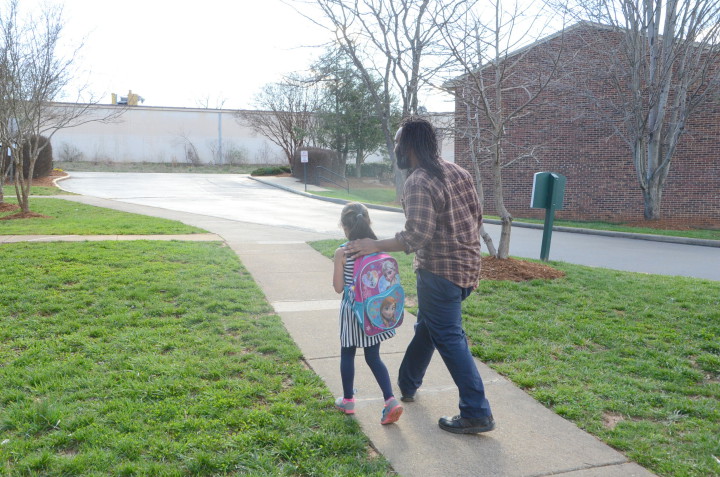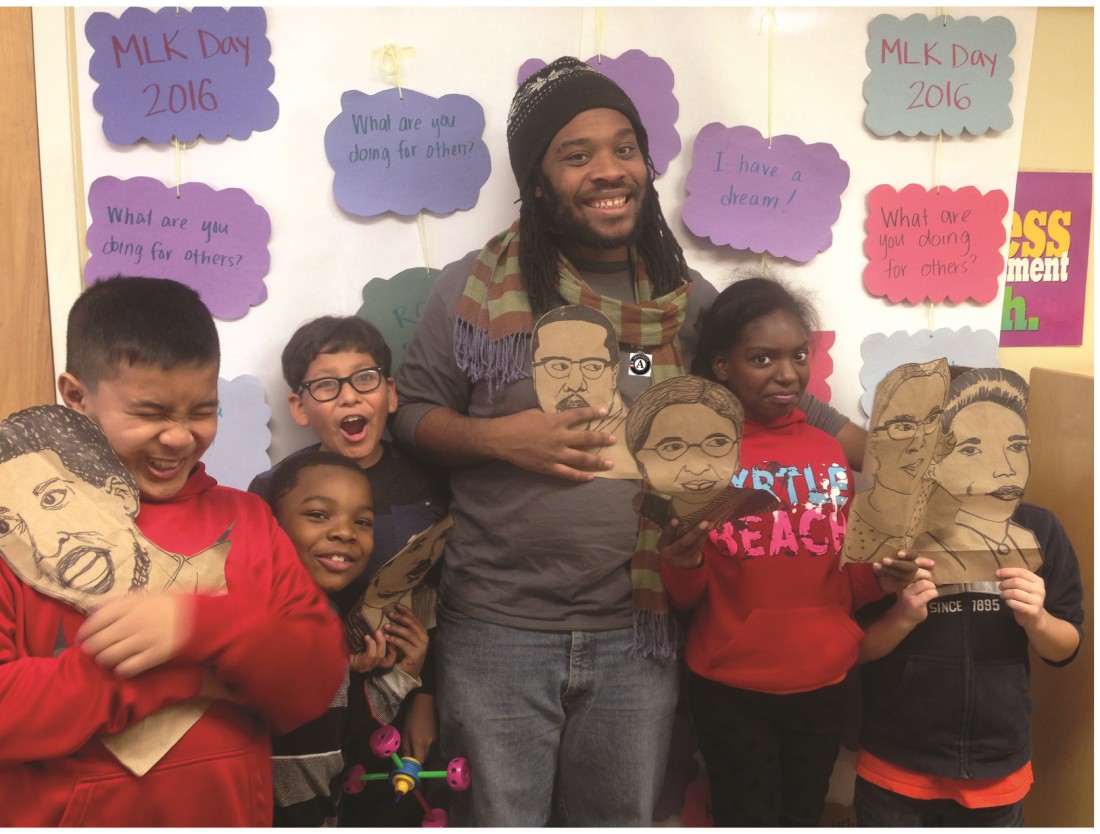“I was looking for direction in my life,” says Sean Sawyer, a 2011 graduate in multimedia (new media) from UNC Asheville. He was working full time in the service industry, but felt a pull to do something that both fulfilled him and enriched the lives of others.
“I knew people who had served in AmeriCorps, so I started doing some research,” Sawyer says. “My girlfriend found Children First/Communities In Schools (CIS) Project POWER/AmeriCorps and sent me the information. I applied and was accepted, and I’ve been a team member since August 2015.”
AmeriCorps is a national service program that recruits members to strengthen communities, build leaders and expand horizons. Children First/Communities In Schools (CIS) runs the Project POWER/AmeriCorps program here in Asheville. Each year, it recruits 25 members to work with at-risk youth, typically placing its team members in a school as a teacher’s assistant, volunteer coordinator or garden manager — and oftentimes, all of these fall under their job description. In the afternoons, they go to a nonprofit and work at an afterschool center, providing much needed help for at-risk youth.

Many of the AmeriCorps team members are recent college graduates, with an abundance of passion, commitment and enthusiasm for making a real difference in the world. The team members must commit to a year of service, where they will earn a living stipend of $12,100 a year. They are obligated to serve 1,700 hours of service at their placement sites, which breaks down roughly to 30 to 40 hours a week, a full-time job. Many of them far outreach that number by volunteering their time outside of their service sites. To highlight some of the impact the Project POWER/AmeriCorps team members have on our community, last year they served over 2,000 at-risk students in Asheville and Buncombe County and roughly 42,000 hours in our schools and nonprofits.
By joining the Project POWER/AmeriCorps, team members get the opportunity to discover new skills, talents and interests while also developing professional networks and skills.
Sean works at Emma Elementary School as an academic enrichment specialist in the mornings, where he assists staff and students in all four third-grade classrooms. In the afternoons, he is a site leader for the Children First/CIS Learning Center at Woodridge, a safe-haven after-school program that is free to parents and located on site a low-income community to alleviate transportation barriers. At the learning center, he and two other Children First/CIS project POWER/AmeriCorps site leaders provide a healthy snack, homework help and enrichment activities for 20 students in kindergarten through fifth grade.
Almost 100 percent of the children Sean works with are living at or below poverty. Emma Elementary School serves all of its students breakfast and lunch through the Community Eligibility Provision — a federally funded provision from the Healthy, Hunger-Free Kids Act of 2010 that allows schools and local educational agencies with high poverty rates to provide free breakfast and lunch to all students enrolled in the school.
Some of the students Sean works with show up to school hungry and tired — having had little or no sleep due to overcrowded living conditions — and suffer from poor health and high levels of toxic stress. Unfortunately, this is very typical for children living in poverty.
Children from low-income families are more likely to come to school behind, have undiagnosed learning disabilities, score lower on academic achievement tests, and drop out of school. They have less access to adequate health care and are six times as likely to live in homes without enough food, along with living in high-crime neighborhoods.
But to Sean, they are the best part of his day. “The minute I walk through the doors (of Emma Elementary and the Children First/CIS Learning Center), I get a rush. Everything else disappears, and it’s just me and the kids. They come up to me and give me high-fives and are so excited to see me. Every day they show me that they appreciate my presence and they want to work with me.”
Because of it high numbers of students from low-income families, Emma Elementary School receives Title 1 funding, which is allocated to schools with a high poverty rate to help children who are failing, or most at risk of failing, to meet state academic standards.
Every day, Sean works with a small group of students enrolled in a Title 1 reading and grammar program, but he is teaching much more than academics.
“When we first started, if one of the children got an answer wrong, they would immediately give up. I have been teaching them that it’s OK to make mistakes — that you can learn from them. Now, if they make a mistake, they keep going. They don’t give up like they once did.”
He tells of one of his students who is very shy and timid, but after almost a year of working with him every day, he sees how he is raising his hand and speaking up no matter if he is right or wrong. “He is finding his voice,” Sean says with pride. “He is not afraid to share his opinion, and that is something that can have a long-term positive impact.”
Research shows that having a consistent, caring adult in the lives of vulnerable children is key to improving absenteeism, academics and behaviors.
His role as a mentor, teacher, role model, site leader and friend to his students is something that Sean takes seriously. “Seeing how the children respond to me as a trusted and safe person has really shaped how I am planning my future.”
He plans on serving another year as an AmeriCorps team member, and then becoming an elementary school teacher through the lateral entry program. “I never thought I would be interested in working in the public education field,” he says. He has been a long-time artist and musician; in fact, you can find him busking with his accordion in downtown Asheville on most weekends. But now he feels a calling to teach elementary-age children. And he gives all the credit to his experience as a Children First/CIS Project POWER team member.
“I am thankful for this opportunity to serve with Project POWER/AmeriCorps,” continues Sean. “It has made me feel like I am a part of a team — like what I do counts. We give the communities that we serve hope. They know that there are people looking out for them and their children.”
If you are interested in being a positive influence in the lives of vulnerable youth in Buncombe County, become a member of the Children First/CIS Project POWER/AmeriCorps Team 19. Applications are being accepted for both the summer placement and for full-time/year-round placement. For application details, go to www.childrenfirstcisbc.org/job-posting.
Jodi Ford is the outreach and engagement coordinator for Children First/ Communities In Schools of Buncombe County, a local nonprofit that believes all children deserve to reach their full potential. The organization helps achieve this by bringing together resources to help children succeed in their schools and at home. That help includes providing a food boxes, tutoring and mentoring in school and after school, getting school supplies, teaching parenting skills and helping families meet basic needs. Along with services, the nonprofit is also a strong advocates for children and their families with local and state policy makers. To find out more, go to www.childrenfirstcisbc.org




Before you comment
The comments section is here to provide a platform for civil dialogue on the issues we face together as a local community. Xpress is committed to offering this platform for all voices, but when the tone of the discussion gets nasty or strays off topic, we believe many people choose not to participate. Xpress editors are determined to moderate comments to ensure a constructive interchange is maintained. All comments judged not to be in keeping with the spirit of civil discourse will be removed and repeat violators will be banned. See here for our terms of service. Thank you for being part of this effort to promote respectful discussion.